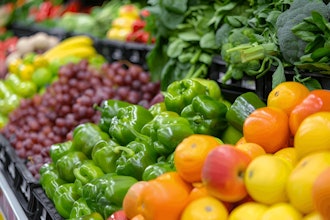HARTFORD, Connecticut (AP) — Robert Burns, an organic farmer in eastern Connecticut, is candid in describing his business interest in state legislation requiring that genetically modified food be labeled.
"If you're an organic producer now, you should get ready for an increase in sales," said the grower of lettuce, mung beans, red winter wheat berries and other vegetables.
Consumer demand for labeling is rising and producers will have little choice but to comply, he said.
Many backers of similar legislation in more than a dozen states say their intent is to give consumers more information about what they're eating.
Genetically modified food includes products altered to resist pesticides or improve nutritional content. The U.S. Food and Drug Administration says genetically modified foods pose no greater health risks than traditional foods, and opponents of labeling rules say packaging costs would rise for no particular reason because no health hazard has been found.
Organic farmers say they stand to benefit from better informed consumers who may reject genetically modified products and instead choose organic food.
"It's part of what the organic food industry needs to keep moving forward," said Albert Straus, founder and president of the Straus Family Creamery, an organic dairy in Petaluma, California.
He does not use genetically modified feed for his herd, and said growth hormones in cows were halted by consumer opposition.
"It was consumers who made the change, not industry or government," Straus said.
Several organic growers say their business has benefited for years from increased consumer scrutiny of agribusiness and rising demand for locally grown food. Many are now ratcheting up the pressure, lobbying in 18 states for laws that would require labeling of genetically modified food, partly to establish a bright line between their products and those of big growers.
"The consumer for the most part doesn't even know what genetically engineered crops are," said Ray McEnroe, owner of McEnroe Organic Farm in Millerton, New York. "This would be more of an education for them."
Connecticut lawmakers were the first to advance a measure out of a committee last month, but were careful to avoid taking sides in the argument about whether genetically modified food has an impact on health. Legislators instead said they want only to provide more consumer information.
State lawmakers in Vermont are considering a similar measure. A lawmaker said the bill will not likely pass, but legislators will lay the groundwork for its consideration next year.
"It's really just moving the conversation along," said Democratic Rep. Tess Taylor, a member of the House Agriculture Committee.
In California, volunteers are gathering signatures to force a ballot question in November calling for labeling of genetically modified food. Supporters include farmers, consumers and others, said Gary Ruskin, campaign manager of the California Right to Know initiative.
"More than anything else, it's a lot of moms who want to know what's in the food they serve their families and kids," he said.
Bill Duesing, an organic farmer and executive director of the Northeast Organic Farming Association of Connecticut, said labeling requirements "might push things to organic."
However, the benefits to organic farmers in Connecticut would be minimal because most labels would be required on processed food, not consumer-ready products such as fruits and vegetables, he said.
Labeling genetically modified food in the United States will make domestic markets more competitive with markets in Europe, which imposes guidelines on informing consumers about genetically modified food, said Ronnie Cummins, national director of the Organic Consumers Association.
Labeling genetically modified food could just as likely prod consumers to buy non-organic food that's not genetically modified as much as it would motivate consumers to purchase organic food, which is more expensive because it's produced on a smaller scale and requires more labor, said Timothy Lytton, a professor at Albany Law School who is writing a book about industry certification of kosher food.
The drive for labeling genetically modified food is "part of generalized anxiety people have about the industrialized food industry," Lytton said.
Burns said Connecticut's legislation is specifically intended to help organic food producers.
"When we crafted the bill that was one of the things in mind: Organics will profit with labeling," he said. "It's a wonderful way to raise the consciousness of consumers."




















